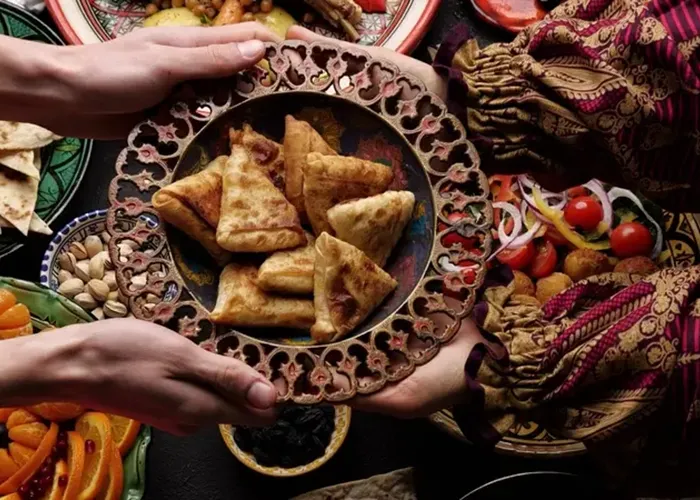Editorial – volume01 Issue17
The Islamic Perspective on Food and Poverty: A Call for Compassion and Justice
Introduction
World Food Day (16 October) and the International Day for the Eradication of Poverty (17 October) raise global awareness about hunger and poverty, both of which are intertwined and pressing issues. Islam offers comprehensive guidance on these matters, advocating for the consumption of lawful (Halal) and wholesome (Tayyib) food, and emphasising charity and social justice as moral duties. This article explores how Islamic principles address food consumption and poverty alleviation, offering a pathway toward a more compassionate and equitable world.
Food in Islam: A Holistic Approach
Islam’s teachings on food encompass several topics including dietary laws, consumption etiquette, and the moral obligation to feed others.
Wholesome and Lawful Food (Tayyib and Halal)
The Quran urges believers to consume lawful and wholesome food:
“يَا أَيُّهَا النَّاسُ كُلُوا مِمَّا فِي الْأَرْضِ حَلَالًا طَيِّبًا” (سوره مبارکه بقره،
“O mankind, eat from whatever is on earth [that is] lawful and good.” (Quran, 2:168).
This verse highlights the importance of maintaining physical and spiritual health through pure and permissible food.
Avoiding Unlawful and Harmful Food
The Quran prohibits certain harmful foods to protect both body and soul:
“حُرِّمَتْ عَلَيْكُمُ الْمَيْتَةُ وَالدَّمُ وَلَحْمُ الْخِنزِيرِ وَمَا أُهِلَّ لِغَيْرِ اللَّـهِ بِهِ” (سوره مبارکه مائده،
“Forbidden to you [for food] are dead animals, blood, the flesh of swine, and that which has been dedicated to other than Allah…” (Quran, 5:3).
By abstaining from prohibited foods, Muslims protect their spiritual purity and well-being.
Effects of Food on the Soul
When Imam Hussain (peace be upon him) saw that his words of truth were not affecting the hearts of the people of Kufa, he explained the reason by saying:
فَقَدْ مُلِئَتْ بُطُونُکُمْ مِنَ الْحَرَامِ وَ طُبِعَ عَلَی قُلُوبِکُمْ (بحارالانوار، ج 45، ص8).
“Your stomachs have been filled with unlawful (haram) food, and your hearts have been sealed.”
This highlights the profound link between what we eat and our spiritual state.
The Etiquette of Eating and Drinking
Islam advises moderation in eating and drinking. The Quran states:
” وَكُلُوا وَاشْرَبُوا وَلَا تُسْرِفُوا إِنَّهُ لَا يُحِبُّ الْمُسْرِفِينَ” (سوره مبارکه اعراف،
“Eat and drink but be not excessive. Indeed, He likes not those who commit excess.” (Quran, 7:31).
Practicing moderation not only benefits personal health but also addresses global food insecurity by preventing waste.
The Virtue of Feeding the Hungry
Feeding others, especially the hungry, is highly meritorious in Islam. Prophet Muhammad (PBUH) further emphasised sharing food:
“مَنْ أَكَلَ وَذُو عَيْنَيْنِ يَنْظُرُ إِلَيْهِ وَلَمْ يُوَاسِهِ ابْتُلِيَ بِدَاءٍ لَا دَوَاءَ لَهُ” (تنبيه الخواطر: ١ / ٤٧).
“Whoever eats while a creature with eyes (whether human or animal) is looking at him and does not share, will be afflicted with an illness without cure.”
Furthermore, Imam Sadiq (AS) said:
“مِنْ مُوجِبَاتِ الْمَغْفِرَةِ إِطْعَامُ السَّغْبَان” (المحاسن، ج2، ص389).
“One of the causes of forgiveness is feeding the hungry.”
These beautiful quotations highlight the moral responsibility to share with both humans and animals, reflecting Islam’s compassion for all living beings.
Poverty in Islam: A Call for Social Justice
Islam’s approach to poverty focuses on ethical wealth redistribution and fulfilling the rights of the needy.
Charity and the Rights of the Poor
Helping the poor in Islam is a fulfilment of their rights. The Quran beautifully illustrates the reward of charity:
“مَثَلُ الَّذِينَ يُنْفِقُونَ أَمْوَالَهُمْ فِي سَبِيلِ اللَّهِ كَمَثَلِ حَبَّةٍ أَنْبَتَتْ سَبْعَ سَنَابِلَ فِي كُلِّ سُنْبُلَةٍ مِائَةُ حَبَّةٍ وَاللَّهُ يُضَاعِفُ لِمَنْ يَشَاءُ وَاللَّهُ وَاسِعٌ عَلِيمٌ” (سوره مبارکه بقره،
“The example of those who spend their wealth in the way of Allah is like a seed [of grain] that sprouts seven ears; in every ear is a hundred grains. And Allah multiplies [His reward] for whom He wills.” (Quran, 2:261).
This metaphor highlights the multiplying effect of charity, benefitting both the giver and society.
Giving Charity Secretly and Openly
The Quran encourages continuous acts of charity, both publicly and privately:
“الَّذِينَ يُنْفِقُونَ أَمْوَالَهُمْ بِاللَّيْلِ وَالنَّهَارِ سِرًّا وَعَلَانِيَةً فَلَهُمْ أَجْرُهُمْ عِنْدَ رَبِّهِمْ وَلَا خَوْفٌ عَلَيْهِمْ وَلَا هُمْ يَحْزَنُونَ” (سوره مبارکه بقره،
“Those who spend their wealth [in charity] by night and by day, secretly and publicly, they will have their reward with their Lord. And no fear will there be concerning them, nor will they grieve.” (Quran, 2:274).
This verse reminds us that charity, whether seen or unseen, brings peace to the soul and frees one from fear and sorrow.
Identifying and Helping the Hidden Poor
Islam also encourages helping those too shy or proud to ask for assistance. The Quran says:
“وَفِي أَمْوَالِهِمْ حَقٌّ لِلسَّائِلِ وَالْمَحْرُومِ” (سوره مبارکه ذاریات، 19).
“And in their wealth is a known right for the beggar and the deprived.” (Quran, 51:19).
The “deprived” are those in need who may not outwardly ask for help, reminding Muslims to be proactive in helping those less visible. Another very important point in this verse is that helping others is not seen as an act of favour by the one offering help, but rather as the fulfilment of a duty and a right that is owed to the recipient.
Conclusion
Islam’s teachings on food and poverty offer practical solutions for today’s global challenges. By promoting lawful consumption, moderation, and the virtue of feeding others, Islam fosters a more compassionate society. On the other hand, its comprehensive framework on poverty, centred around charity and social responsibility, calls for collective action to eradicate hunger and inequality.
World Food Day and the International Day for the Eradication of Poverty remind us of our duty to ensure that no one goes hungry, and poverty is addressed through justice, charity, and compassion. Islamic teachings offer timeless guidance for building a world where both food security and social equity prevail.
editor's pick
news via inbox
Subscribe to the newsletter.




